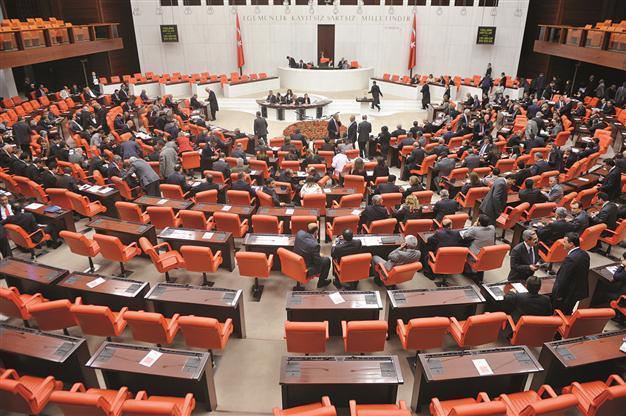Can charter help peace process?
ANKARA - Hürriyet Daily News

The ruling AKP has de facto moved the deadline of the working period of Parliament’s Constitutional Conciliation Commission to the end of April. DAILY NEWS photo, Selahattin SÖNMEZ
While debate is ongoing on the early negotiations launched with Abdullah Öcalan at İmralı to silence arms, Kurdish politician Ahmet Türk - who has also been a part of the negotiations - has brought forward a number of proposals for the new Constitution. “A constitutional change based on constitutional citizenship is inevitable. The concept of citizenship should be introduced, while the Constitution should contain a maximum of 20 articles,” he said, obviously after having spoken about the subject with Öcalan.Deputy leader of the Justice and Development Party (AKP), Hüseyin Çelik, offered the following interpretation: “If you think the question ‘what do you think?’ will be posed to Apo [Öcalan], then you are mistaken.” On the other hand, Parliament Speaker Cemil Çiçek said the new Constitution efforts should be kept apart from the newly launched İmralı process.
No doubt, the writing of the new Constitution, which has been ongoing for more than a year, is being conducted outside the İmralı process. However, the ruling party’s proposals both on its content and configuration have demonstrated that the new Constitution may well have a facilitating role to play on the road to peace.
When the AKP approved an extension of three months to the deadline it had set for the completion of the new Constitution in December 2012, it involuntarily revealed that it wanted to submit a constitutional infrastructure support for the “Kurdish Spring” or “peace.” It has therefore been interpreted that the new Constitution, with the launch of the İmralı process, has become very important from the AKP’s viewpoint. The AKP has de facto moved the deadline of the working period of the Constitutional Conciliation Commission to the end of April. It will search for a consensus during this period, but if it cannot find one it may bring up the option of a referendum for the unresolved sections.
As a matter of fact, the AKP’s Mustafa Şentop even told me that all articles may be subject to a referendum, regardless of whether or not they have been agreed upon at the Commission.
It is also a fact that the AKP is generating content aimed at satisfying the Kurds in a number of articles of the new Constitution. Several important articles, primarily the one related to constitutional citizenship, include content providing infrastructure for the “peace process.” Moreover, it can be said that certain articles are being written in partnership with the Peace and Democracy Party (BDP).
The AKP’s first important proposal came with the “Constitutional Citizenship” article, which differs greatly from the existing article. In its proposal, the AKP did not use the expression present in the current Constitution: “Anybody who is connected to the Turkish state with the bond of citizenship is a Turk.” The AKP drafted the article as follows: “Citizenship is a basic right. It is gained and lost according to the conditions written in the law. Nobody can be stripped of citizenship.”
The AKP proposal on the language of education has also been arranged so that it can accommodate “education in mother tongue” in the future. The following article in the current Constitution has been left out of the party’s proposal: “No language other than Turkish can be used as a mother tongue in education.”
In its constitutional proposal regarding local administrations, the AKP is again preparing to take steps that may be effective in solving the Kurdish problem. Among these steps are the transferring of certain powers from the central administration to local government and the strengthening of local governments economically and administratively.
Therefore, it can be said that at least a few of the AKP’s new constitutional proposals give the impression that they have been drafted in light of finding a solution to the Kurdish issue. Time will show whether the ruling party will be able to find a partner to support these proposals other than the BDP.
Ministers to mayors' posts?
It is being whispered that some of the Cabinet ministers who have served for three terms will be made mayoral candidates in the local elections in March 2014. Names that are being pronounced are Egemen Bağış for Istanbul, Binali Yıldırım for İzmir, Ali Babacan for Ankara and Nihat Ergün for Kocaeli. The latest whisper is that in a possible Cabinet reshuffle, these names will keep their posts but will run for office in the local elections while occupying the ministerial posts.
Fact-finding commission
The first concrete step for the fact-finding commission proposed by Parliament’s Coup and Military Memorandum Investigation Commission is coming from the main opposition Republican People’s Party (CHP) instead of the ruling Justice and Development Party (AKP). The deputy chairman of the CHP, Sezgin Tanrıkulu, has prepared a proposal. It is expected to be submitted to the Office of the Parliamentary Speaker soon. If it is decided that such a commission will be formed, then the fact-finding commission will be composed of wise people from political parties and will investigate several dark spots in the country’s past.











